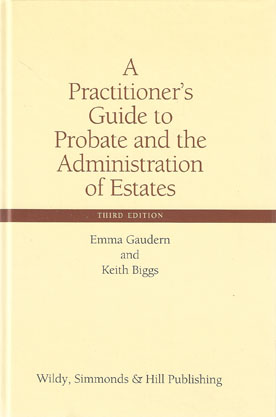
The third edition of A Practitioner’s Guide to Probate and the Administration of Estates (previously published as Probate and the Administration of Estates: The Law and Practice) is a practical and comprehensive guide to all forms of non-contentious probate and applications and the administration of estates.
It provides careful explanations of every step in the procedure for winding up the estate of a deceased person, from taking initial instructions to the final distribution of the estate and closing the file. Written by practitioners for practitioners, it is packed with hints and tips, covering procedural complexities, tricky tax points, avoiding delay and more.
The book opens with advice on meeting the client and taking proper instructions, moving on to tracking down the assets and liabilities which comprise the estate; completing inheritance tax forms and obtaining any available reliefs and allowances; questions concerning wills and intestacies, applying to the probate registries discretionary orders, obtaining grants of representation, collecting in the paying debts and liabilities, identifying the beneficiaries and paying the legacies, finalising the tax situation; and distributing the residue of the estate.
An accompanying CD-ROM contains a comprehensive set of precedent forms, enabling practitioners to adapt precedents for their own use.
This new edition has been completely revised and updated and contains a comprehensive guide to the completion of the current forms relating to Inheritance Tax and applications to the probate registries for discretionary orders and grants of representation.
"Throughout this excellent book the authors have continued their mission to adopt a practical approach to the subject...The structure of the book is a great asset throughout...What is particularly helpful for practitioners is the comprehensive guide to the completion of the current forms relating to Inheritance Tax and applications for discretionary orders and grants of representation. Legal advisers will find the CD excellent help for precedents as blueprint drafts which can be adapted for your specific case...thoughtful, and most useful"
Philip Taylor, Richmond Green Chambers